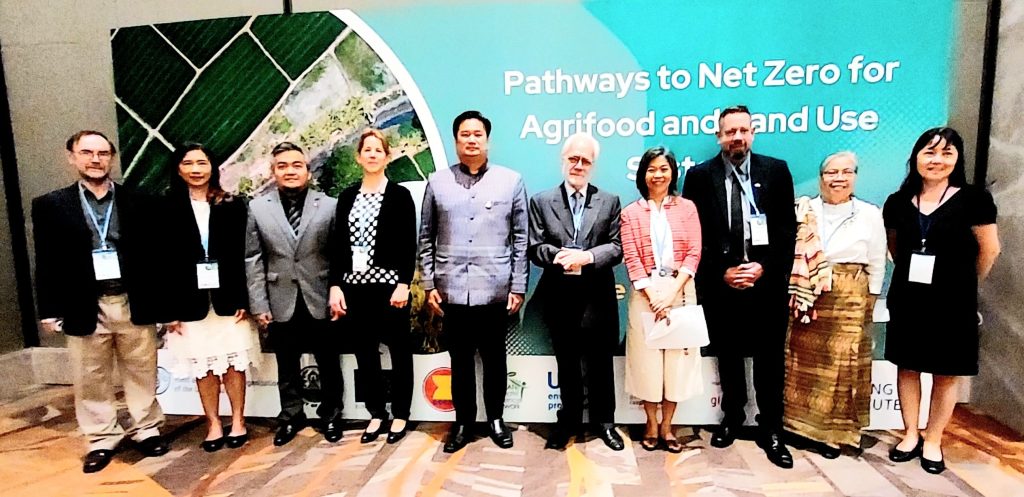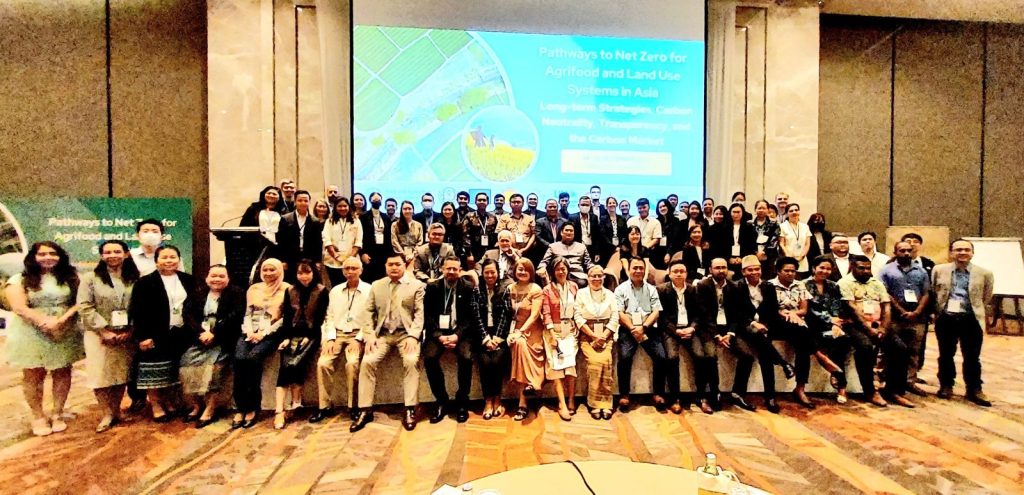
Bangkok/ 14 December 2022 — Members of the ASEAN Climate Resilience Network (ASEAN-CRN) along with representatives from government and international organizations in the agriculture, land use and climate sectors attended a regional workshop on “Pathways to Net Zero for Agrifood and Land Use Systems in Asia: Long-term Strategies, Carbon Neutrality, Transparency, and the Carbon Market”. The objective was to exchange information on nationally determined contributions (NDC) and long-term strategies (LTS), strengthen transparency systems to monitor and report on the national targets, and enhance readiness to access climate finance. Organized in a hybrid format, the three-day event featured presentations by experts, lively discussions, group exercises and a field trip on the last day. The results of the workshop will be fed into the drafting of the ASEAN Decarbonisation/Carbon Neutrality Strategies.
In his opening statement, Mr. Rapibhat Chandarasrivongs, Director General of the Department of Agriculture (DoA), Thailand, and ASEAN-CRN Chair, stated, “We are gathered here today to understand the critical concepts and Thailand’s obligations, as well as to find a way and opportunities to transform to a low-emission and resilient agricultural system and in the forestry sector too. The questions we need to ask are how we can make a net zero agricultural system possible and how we can make the carbon market acceptable while supporting smallholder farmers This includes all other agricultural production systems.” A multi-country platform is of paramount significance as “we still have much to work on and learn,” he added.
Mr. Aldo Dell’Ariccia, Team Leader, the EU-ASEAN Enhanced Dialogue Instrument (E-READI) project, pointed out that although the ASEAN Member States (AMS) have all signed the Paris Agreement and have taken ambitious commitments to contribute towards the global goal of limiting the warming of the planet to 1.5 degrees, the AMS is still at the beginning in understanding the concepts of net zero, decarbonisation, carbon neutrality and how all these can be applied to agriculture.
Ms. Hang Thi Thanh Pham, Senior Resilience Officer, the FAO Regional Office for Asia and the Pacific, said: “We need to set out an implementation plan to materialize actions that reduce emissions and make the agrifood system resilient. Underlying this effort is the decision-making process, policies, measures, action plan and access to finance which will be key to making the transformation of the agri-food system happen.”
Mr. Dian Sukmajaya, Senior Officer, Food, Agriculture and Forestry Division, Sectoral Development Directorate, ASEAN Economic Community Department (AECD), ASEAN Secretariat, reaffirmed ASEAN’s commitment to promoting sustainable and circular agriculture, reducing harmful agrochemicals, promoting nature-based solutions and decarbonization, and strengthening digital technology application. He also underscored the importance of a regional platform such as this to exchange views on current international indictments, particularly climate change and setting a regional agenda on moving towards low emission agrifood system.
Ms. Pouchamarn Wongsanga, Team Leader, ASEAN AgriTrade project, the Deutsche Gesellschaft für Internationale Zusammenarbeit (GIZ) GmbH, said: “The ASEAN-CRN has been established to ensure that ASEAN member states (AMS) are in a better position to adapt their agricultural sectors to climate change and optimize its mitigation potential. The network has generated a number of policy materials that guide the AMS to transform their food production practices. That is why the ASEAN AgriTrade project, Agritrade which is funded by the German Federal Ministry for Economic Cooperation and Development (BMZ), has been supporting ASEAN-CRN to organize a series of knowledge exchange events, particularly in setting the 2050 vision of resilience and low emission in the ASEAN region.”
The regional workshop was organised by Thailand’s DoA, the EU-ASEAN Enhanced Dialogue Instrument (E-READI), the FAO RAP, the United Nations Environment Programme (UNEP), GIZ and Mekong Institute in cooperation with the ASEAN Secretariat (ASEC).
